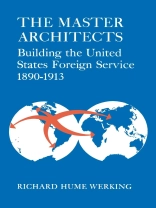During the twenty years before World War I, several key figures worked to improve the foreign service and to reform its appointment system. Richard Hume Werking explores both the methods and the motives of these ‘master architects.’ Unlike other scholars, Werking finds that the foundations and general structure of the United States foreign service emerged before World War I. He sees its development as prompted less by foreign crises than by economic conditions—particularly the need to stimulate export trade. Indispensable to its growth were the dedicated efforts of bureaucrats who were loyal to national interests but wished the opportunity to do interesting work and to receive recognition when they did it well.
Sobre o autor
Richard Hume Werking received his Ph.D. in history from the University of Wisconsin. He is on the library staff at Lawrence University, Appleton, Wisconsin.












